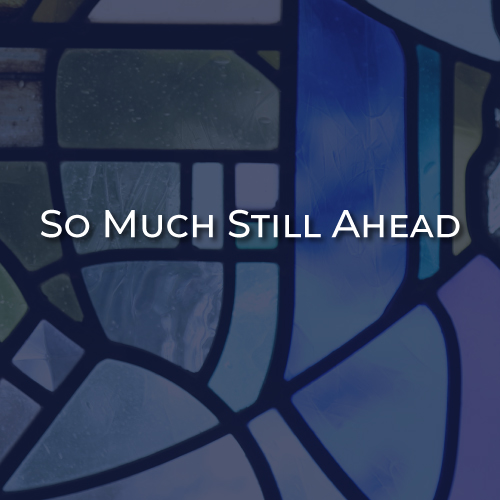Neither Optimist nor Pessimist
by: Colton Underwood, Associate Pastor of Children, Youth and Families
 My mother always called me a pessimist and my usual reply was to say that I’m simply a realist. I think most of us have grown to feel this way. The world around us seems in a bad way and it isn’t unfair to point that out. It would be naive, it seems, to claim that Christianity in the West has never been in a stronger place. transcendental tie and without any earthly reason.” For, he writes, “men did not love Rome because she was great. She was great because they had loved her.” We’ve been called to love God for God’s sake. That is, to love God not just for what he can give us, but for himself. That is the true center of love. Then, flowing out from this ultimate love, the love of man toward creature and creation becomes a love for God’s sake. We ought to love our church enough to see its flaws and yet fight for her all the more fiercely. We ought to love our families, our country, our friends, and all other things in creation in the same way. So the question remains before us, can we love our world, our town, or our church so boldly? To paraphrase Chesterton one last time, can we hate it enough to change it, and yet love it enough to think it worth changing? When we look around and see chaos (the results of abandoning and despising our heritage, those who would dance on the graves of our fathers all while not realizing that their homes are founded upon the ruins of a great people that they have taken utterly for granted) terms like realism, pessimism, and despair have a great deal of overlap.
My mother always called me a pessimist and my usual reply was to say that I’m simply a realist. I think most of us have grown to feel this way. The world around us seems in a bad way and it isn’t unfair to point that out. It would be naive, it seems, to claim that Christianity in the West has never been in a stronger place. transcendental tie and without any earthly reason.” For, he writes, “men did not love Rome because she was great. She was great because they had loved her.” We’ve been called to love God for God’s sake. That is, to love God not just for what he can give us, but for himself. That is the true center of love. Then, flowing out from this ultimate love, the love of man toward creature and creation becomes a love for God’s sake. We ought to love our church enough to see its flaws and yet fight for her all the more fiercely. We ought to love our families, our country, our friends, and all other things in creation in the same way. So the question remains before us, can we love our world, our town, or our church so boldly? To paraphrase Chesterton one last time, can we hate it enough to change it, and yet love it enough to think it worth changing? When we look around and see chaos (the results of abandoning and despising our heritage, those who would dance on the graves of our fathers all while not realizing that their homes are founded upon the ruins of a great people that they have taken utterly for granted) terms like realism, pessimism, and despair have a great deal of overlap.
What is the Christian to do? Does he look at the world with rose-colored glasses and hide his head in the ground as an optimistic ostrich, unwilling to look hard truths in the eye? Or does she scowl at the sun, call herself a realist and give in to despair, feeling helpless to change a society that feels too far gone?
A great Catholic writer of the early twentieth century, GK Chesterton, considered the same difficulty in his day. Are optimism and pessimism the two paths before us? Is there no other road? He wrote, “the point is not that this world is too sad to love or too glad not to love; the point is that when you do love a thing, its gladness is a reason for loving it, and its sadness a reason for loving it more.” Chesterton’s resolve is that Christians ought to be both brutally honest about the world and yet see that the warts are not a reason to flee or to despair. No, the warts and wounds should provoke the one response that will do something: love.
Perhaps that sounds trite. How appropriate to our day to say that love is the solution! And yet, as Christians, we know that it must be true. How can we balance the reality of being exiles in the world and yet called to pray and work for the welfare of the place of our exile? How can we embrace being “not of this world” while heralding the truth that the earth is the Lord’s, that all authority in heaven and on earth has been given to the Lord Jesus? By loving the world for God’s sake.
Chesterton would continue his thought to write that, even in a hard and fallen world, “the only way out of it seems to be for somebody . . . to love it with a transcendental tie and without any earthly reason.” For, he writes, “men did not love Rome because she was great. She was great because they had loved her.”
We’ve been called to love God for God’s sake. That is, to love God not just for what he can give us, but for himself. That is the true center of love. Then, flowing out from this ultimate love, the love of man toward creature and creation becomes a love for God’s sake. We ought to love our church enough to see its flaws and yet fight for her all the more fiercely. We ought to love our families, our country, our friends, and all other things in creation in the same way. So the question remains before us, can we love our world, our town, or our church so boldly? To paraphrase Chesterton one last time, can we hate it enough to change it, and yet love it enough to think it worth changing?




 Close
Close

 In the passages preceding it, we find Samuel at a low point. He’s been rejected by the people, his own sons have betrayed him, the man he felt forced to anoint as king has failed in dramatic fashion to fulfill his duty of office, and so Samuel now sits in his sorrow over lost years and feelings of uselessness. It’s at this juncture in Samuel’s life and ministry that God speaks to him in 16:1, saying, “How long will you grieve over Saul?” But after acknowledging Samuel’s darkened situation—and perhaps offering a soft rebuke—God speaks those words to his saddened heart. “Fill your horn with oil, and go.”
In the passages preceding it, we find Samuel at a low point. He’s been rejected by the people, his own sons have betrayed him, the man he felt forced to anoint as king has failed in dramatic fashion to fulfill his duty of office, and so Samuel now sits in his sorrow over lost years and feelings of uselessness. It’s at this juncture in Samuel’s life and ministry that God speaks to him in 16:1, saying, “How long will you grieve over Saul?” But after acknowledging Samuel’s darkened situation—and perhaps offering a soft rebuke—God speaks those words to his saddened heart. “Fill your horn with oil, and go.” Over our years together, Rachel and I have taken many 10+ hour drives over the course of a single day. On one such occasion in August of 2018, we were facing the long drive back to Jackson, MS after a hot outdoor wedding as the sun began to set against a brilliant evening sky. While driving on previous road trips, I had felt my eyes droop and my head begin to nod (telltale signs of being on the edge of sleep), so I knew my physical limits of exhaustion while driving. During that particular drive home, I used every means possible to keep awake at the wheel. I cranked the AC uncomfortably high, I blasted music that would get my blood moving, I drank an amount of caffeine that was on the edge of unwise, I engaged Rachel in conversation for hours on end, and I even came to the point of slapping myself in
Over our years together, Rachel and I have taken many 10+ hour drives over the course of a single day. On one such occasion in August of 2018, we were facing the long drive back to Jackson, MS after a hot outdoor wedding as the sun began to set against a brilliant evening sky. While driving on previous road trips, I had felt my eyes droop and my head begin to nod (telltale signs of being on the edge of sleep), so I knew my physical limits of exhaustion while driving. During that particular drive home, I used every means possible to keep awake at the wheel. I cranked the AC uncomfortably high, I blasted music that would get my blood moving, I drank an amount of caffeine that was on the edge of unwise, I engaged Rachel in conversation for hours on end, and I even came to the point of slapping myself in 
 nor do I ask that you prefer hymns and psalms over more contemporary worship music whether in corporate gatherings or at home. I merely hope to shine a light on the beauty of what these lines really are.They are the heart-poetry of Christians from age to age, prayers poured out from both joy and anguish, anthems of the people of God to strengthen us in the darkest of nights. For that reason, they ought to have a place not only in our pews, but also in our hearts.
nor do I ask that you prefer hymns and psalms over more contemporary worship music whether in corporate gatherings or at home. I merely hope to shine a light on the beauty of what these lines really are.They are the heart-poetry of Christians from age to age, prayers poured out from both joy and anguish, anthems of the people of God to strengthen us in the darkest of nights. For that reason, they ought to have a place not only in our pews, but also in our hearts. 







.jpg)

